|
|
|
Sort Order |
|
|
|
Items / Page
|
|
|
|
|
|
|
| Srl | Item |
| 1 |
ID:
159783
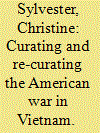

|
|
|
|
|
| Summary/Abstract |
The American war in Vietnam killed 58,000 US military personnel and millions of people on the ground, creating a troubling war legacy that has been ‘resolved’ in the USA through state strategies to efface military mortalities. Drawing on Charlotte Heath-Kelly’s work addressing mortality denied or ignored in the field of international relations and that of Andrew Bacevich and Christian Appy on American militarism, I explore the Vietnam Veterans Memorial in Washington, DC, as a site of war re-curations that refuse the effacement of mortality and disrupt the militarist myths that sustain it – namely, that America is renewed and revitalized through war, and that soldiers live on as American heroes when they sacrifice for the country. With the Vietnam Syndrome long since replaced by insistence on loving all soldiers, even if not all the country’s wars, the Vietnam Veterans Memorial is dedicated to remembering those who were not publicly acknowledged for fighting and dying in America’s failed war. Assemblages of pictures, letters, and other items that a community of loss leaves at the Memorial re-curate the war by showing the lingering pain that war mortality inflicts on those who experience it decade upon decade. Taken together, the objects of war shown at the Vietnam Veterans Memorial and collected each evening put mortality at the heart of war experience. The Memorial is therefore a key location of knowledge that challenges militarist appeals and state effacements in favor of what Viet Thanh Nguyen calls ‘just memory’ of war.
|
|
|
|
|
|
|
|
|
|
|
|
|
|
|
|
| 2 |
ID:
119991
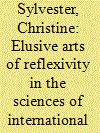

|
|
|
|
|
| Publication |
2013.
|
| Summary/Abstract |
There are a number of highly laudable aspects of Patrick Jackson's broadened discussion of scientific inquiry in the field of International Relations, among them the attention he gives to feminist analysis as exemplary of reflexive science. Yet there are a few worrying elements in his approach as well. This piece addresses issues around Jackson's presentation of feminist analysis and, in addition, tackles his off-handed reinscription of the split between social sciences and the arts (plus his neglect of poststructuralism). Jackson's view of feminist analysis relies on early writings on feminist philosophy of science. He therefore underestimates the goals and the epistemological complexities of current research in feminist International Relations. As a separate but overlapping underestimation, Jackson's drive for a post-foundational science ignores the capacity of the arts to enhance the very qualities of research that attract him to reflexive forms of International Relations science. To overcome both sets of concerns requires enlarging the critical scope of reflexive inquiry.
|
|
|
|
|
|
|
|
|
|
|
|
|
|
|
|
| 3 |
ID:
126066
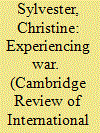

|
|
|
|
|
| Publication |
2013.
|
| Summary/Abstract |
Still preoccupied with inter- and intrastate wars, IR [International Relations] wants to know why wars happen and how they end. It is the period between these two moments that IR war studies has not concerned itself or seriously engaged with. (Parashar 2013, 617, this special section)
This is one of the important points that Swati Parashar makes in her contribution to the discussion here on critical war studies. She offers a number of examples of life 'between these two moments' and life as it is when war in Sri Lanka is said to be over (but is not, in all aspects). She also insists, as another important and underexplored second point, that IR (thinks it) knows war but does not consider the possibility that war knows something about international relations and IR. Is it preposterous that war could know more about those bits of itself blanked out of IR than the master field knows?
|
|
|
|
|
|
|
|
|
|
|
|
|
|
|
|
| 4 |
ID:
046665
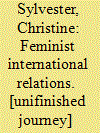

|
|
|
|
|
| Publication |
Cambridge, Cambridge University Press, 2002.
|
| Description |
xii, 350p.
|
| Standard Number |
052179627X
|
|
|
|
|
|
|
|
|
|
|
|
Copies: C:1/I:0,R:0,Q:0
Circulation
| Accession# | Call# | Current Location | Status | Policy | Location |
| 045848 | 327.101/SYL 045848 | Main | On Shelf | General | |
|
|
|
|
| 5 |
ID:
182441


|
|
|
|
|
| Summary/Abstract |
Much material heritage is marked by national memorials to war and its heroes. This article considers two examples that commemorate aspects of defeat, loss, and military disaster in war – the Australian War Memorial and attached museum and the museum and Peace Park at Hiroshima Japan. For Australians, the nation became a recognisable entity in the wake of disastrous defeat at Gallipoli in World War I. The physical manifestation of that heritage combines a solemn mausoleum with a massive and expanding museum that celebrates all Australia’s war contributions since then. For Japan, the peace park in Hiroshima focuses on the civilian heritage of the atom bomb Americans dropped in August 1945. Unlike the Australian Memorial, there is no celebration of war, soldiers, or militarism at the Peace Park. This article explores the differences, similarities, ironies, and contradictions of war heritages built out of crushing instances of loss rather than national moments of victory.
|
|
|
|
|
|
|
|
|
|
|
|
|
|
|
|
| 6 |
ID:
126703
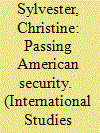

|
|
|
|
|
| Publication |
2013.
|
| Summary/Abstract |
Forum: The State of Feminist Security Studies: Continuing the Conversation. This forum comprises seven pieces conceived in response to the recent Politics & Gender Critical Perspectives section that featured contributions from Carol Cohn, Valerie Hudson, Jennifer Lobasz, Laura Sjoberg, Ann Tickner, Annick Wibben, and Lauren Wilcox (P&G 2011, Vol. 7, Issue 4). Throughout, we refer to this collection as "the CP section."
|
|
|
|
|
|
|
|
|
|
|
|
|
|
|
|
| 7 |
ID:
101477
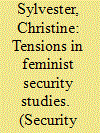

|
|
|
|
|
| Publication |
2010.
|
| Summary/Abstract |
Barry Buzan & Lene Hansen (2009) note that the first glimmer of concern with women and security within international relations and peace studies was a site of tension: in the 1970s and into the 1980s, women were not on the agenda of international relations at all. Peace theorists embraced the concept of structural violence but also excluded women from their discussions. There are now new inclusion/exclusion tensions within feminist international relations and its security wing. In this article I address two tensions: (1) concern to maintain the stance that security is a peace issue as some venture systematically into feminist war studies, and (2) a tendency to issue harsh judgements of feminists whose views challenge the accommodation of cultural difference. I briefly consider examples of these two tensions and suggest ways to work with and beyond the structure of international relations to 'evolve' (feminist) security studies further.
|
|
|
|
|
|
|
|
|
|
|
|
|
|
|
|
| 8 |
ID:
101478
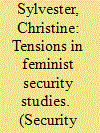

|
|
|
|
|
| Publication |
2010.
|
| Summary/Abstract |
Barry Buzan & Lene Hansen (2009) note that the first glimmer of concern with women and security within international relations and peace studies was a site of tension: in the 1970s and into the 1980s, women were not on the agenda of international relations at all. Peace theorists embraced the concept of structural violence but also excluded women from their discussions. There are now new inclusion/exclusion tensions within feminist international relations and its security wing. In this article I address two tensions: (1) concern to maintain the stance that security is a peace issue as some venture systematically into feminist war studies, and (2) a tendency to issue harsh judgements of feminists whose views challenge the accommodation of cultural difference. I briefly consider examples of these two tensions and suggest ways to work with and beyond the structure of international relations to 'evolve' (feminist) security studies further.
|
|
|
|
|
|
|
|
|
|
|
|
|
|
|
|
| 9 |
ID:
152113
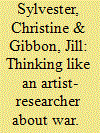

|
|
|
|
|
| Summary/Abstract |
A series of sketchbooks appear in Figure 1. They have been drawn in arms fairs in London and Paris. The halls are crowded – a sea of men and occasional women in pinstriped suits. On show is a huge array of military equipment and security services. Teargas canisters are arranged in glass cabinets, missiles glint under spotlights, guns are lined up to try out against painted targets, tank barrels are raised. There are also body parts, not the casualties of war – they are nowhere to be seen – but displays of gloves, boots, and gasmasks. Here, military equipment ‘steps forth as a commodity, it is changed into something transcendent.’
|
|
|
|
|
|
|
|
|
|
|
|
|
|
|
|
| 10 |
ID:
002581
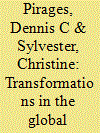

|
|
|
|
|
| Publication |
Houndmills, Macmillan, 1990.
|
| Description |
xiii, 259p.
|
| Series |
MacMillan international political economy series
|
| Standard Number |
0333470788
|
|
|
|
|
|
|
|
|
|
|
|
Copies: C:1/I:0,R:0,Q:0
Circulation
| Accession# | Call# | Current Location | Status | Policy | Location |
| 033855 | 330/PIR 033855 | Main | On Shelf | General | |
|
|
|
|
| 11 |
ID:
113849


|
|
|
|
|
| Publication |
2012.
|
| Summary/Abstract |
This article challenges International Relations to turn its view of war around and start not with states, militaries, strategies, conventional security issues or weapons, and not with the common main aim of establishing causes of war. The challenge is to conceptualise war as a subset of social relations of experience, on the grounds that war cannot be fully apprehended unless it is studied up from people who experience it in myriad ways and not only down from abstract places of International Relations theory. To study war as experience requires that the body come into focus as a unit that has war agency and is also a prime target of war violence. It also requires exploration of the concept of experience. Using an exemplary texts approach, the article briefly reminds us where the field is in its war concerns, before noting work on contemporary wars conducted under the flag of feminist International Relations, where experience and bodies have always been front and centre, and where a social war studies emphasis is developing. The discussion then raises definitional complexities that must be addressed and suggests areas where various International Relations traditions could collaborate with feminist International Relations and fields like anthropology to study the social relations of war.
|
|
|
|
|
|
|
|
|
|
|
|
|
|
|
|
|
|
|
|
|